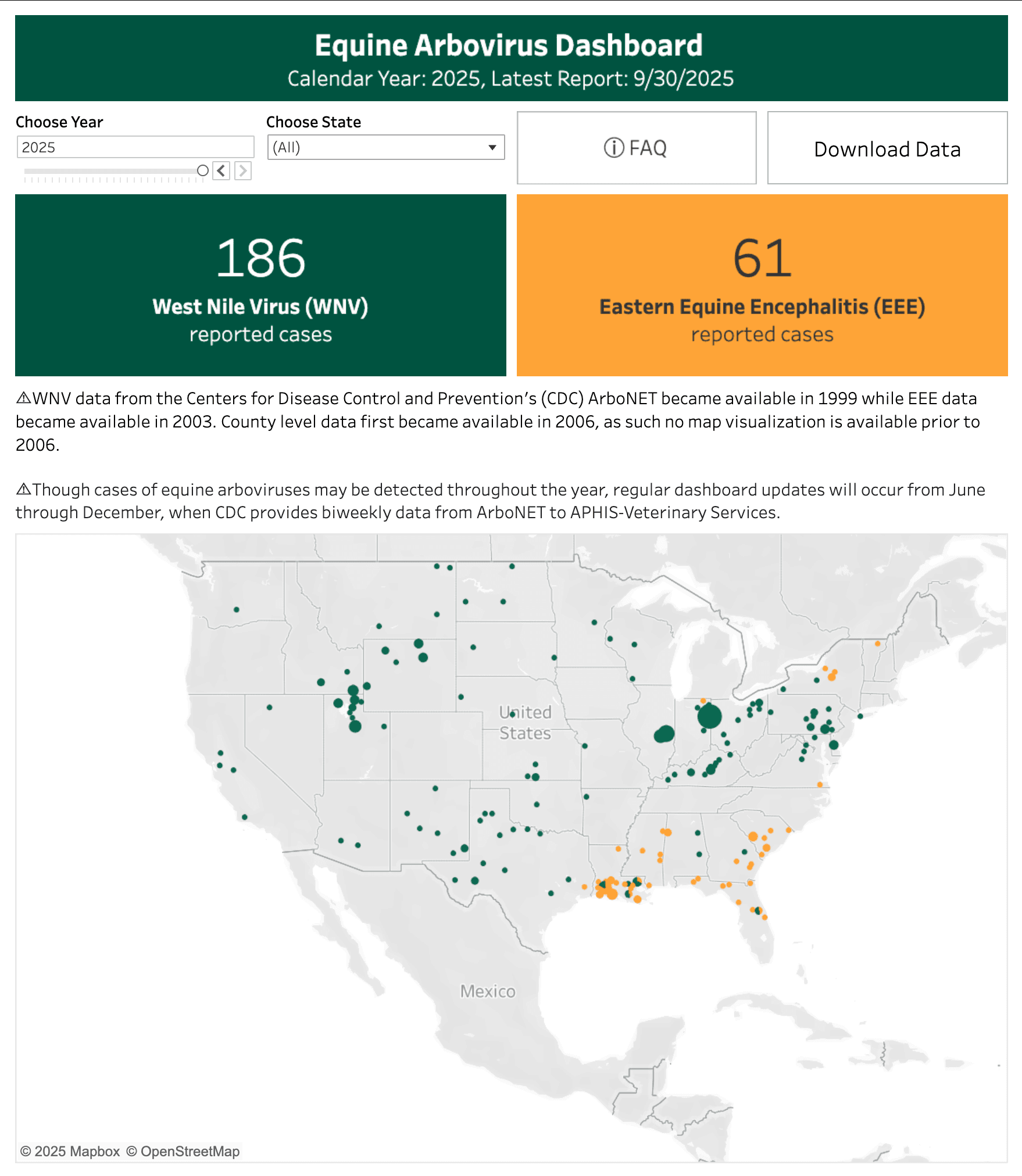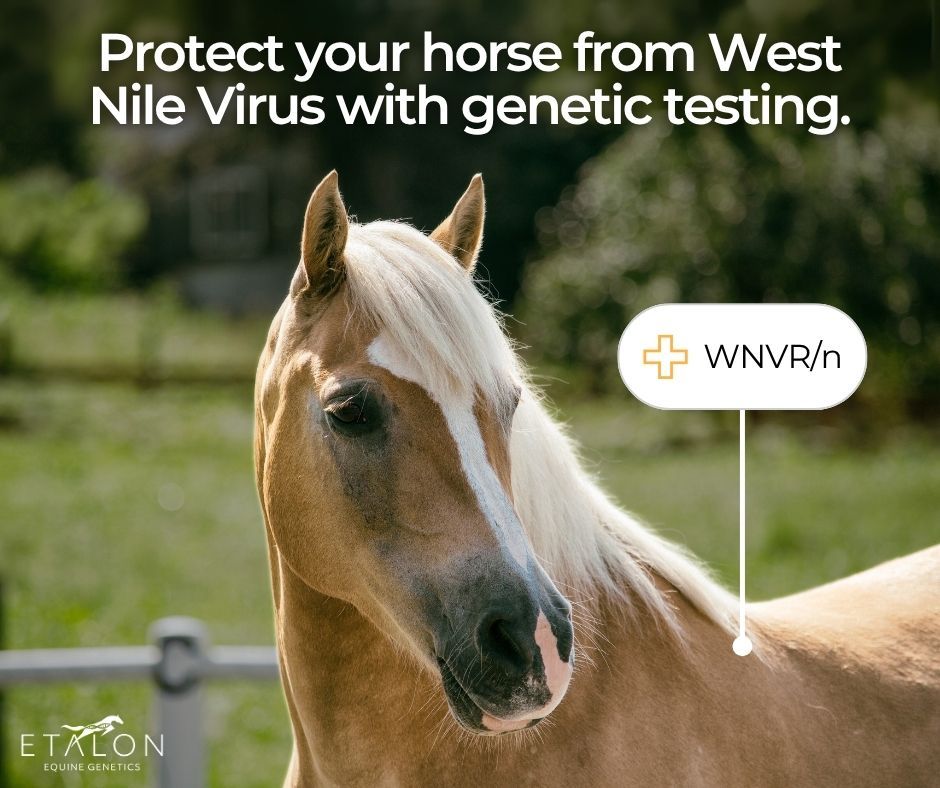Protect Your Horse with Genetic Testing for West Nile Virus Risk (WNVR)
October 7, 2025

West Nile Virus (WNV) continues to pose a serious threat to horses across the United States as the USDA reports showed a +205% total increase in Equine West Nile Virus cases during September!
September 2, 2025: 61 reported cases.
September 16, 2025: 121 reported cases (+98% increase)
September 30, 2025: 186 reported cases (+54% increase)
What does this mean? Timing is critical to test and protect your horse for West Nile Virus!
While vaccination remains the most effective defense to this potentially life-threatening infection, new genetic insights now make it possible to understand a horse’s individual risk level, helping owners take a more proactive approach to protection.
What is West Nile Virus?
West Nile Virus is a potentially severe viral infection transmitted by mosquitoes. Some horses have a genetic predisposition, known as West Nile Virus Risk (WNVR), which indicates a higher susceptibility to developing more severe West Nile Virus symptoms, neural damage and even death.
Health & Viability
West Nile Virus is a severe viral infection that can be lethal. This condition primarily affects the central nervous system, causing symptoms such as:
- Fever
- Ataxia (lack of coordination)
- Muscle weakness
- Encephalitis (acute inflammation of the brain)
- Neurological issues
- Death
Genetic testing for West Nile Virus Risk (WNVR) will help you detect if your horse has a genetic predisposition to developing increasingly severe WNV symptoms.
Prevention
Nearly 98% of horses testing positive for WNV are unvaccinated or under-vaccinated, emphasizing just how critical vaccination is in protecting your horse. Health officials recommend that unvaccinated horses receive their first dose of the vaccine by April 30 to ensure timely protection against West Nile Virus and Western Equine Encephalitis. Regular boosters are also essential, and horse owners should work closely with their veterinarians to follow an annual core vaccination schedule.
In addition to vaccination, genetic testing for West Nile Virus Risk (WNVR) can provide valuable insight into your horse’s individual susceptibility to severe symptoms. Knowing whether your horse is at low, moderate, or high genetic risk allows you and your veterinarian to make informed decisions about vaccination strategies, booster frequency, and mosquito-control measures to give your horse the best possible protection.
Inheritance and Expression
It is important to note that West Nile Virus Risk is a genetic health risk. WNVR results indicate which genetic variant your horse may have and the resulting susceptibility or symptom severity that your horse may experience if they are affected by West Nile Virus. WNVR results do not indicate presence of the disease or indicate past infection!
- Negative (n/n): Horses with no variants detected are likely in the lowest-risk category for symptom severity.
- Heterozygous (WNVR/n): Horses with one variant detected are likely at moderate risk for symptom severity. The horse may show moderate symptoms, which should be managed with supportive care and preventative vaccination.
- Homozygous (WNVR/WNVR): Horses with two variants detected are likely in the highest risk category for symptom onset and severity. The horse may experience more severe symptoms, making it crucial to implement preventive measures, such as vaccination and aggressive mosquito control, to protect these at-risk horses.
Knowing your horse’s genetic risk, whether low, moderate, or high, can help you make informed decisions about vaccination, infection management and preventive measures.
How should WNVR variant information be used?
For any disease, disorders or medical questions, you should always consult your veterinarian so they may assess this information along with any current information and health history of your horse. While it is always advisable to inoculate your horse, this information may be helpful in further assessing how often you inoculate based on your horse's disease susceptibility, your situation, and geographical location. Be sure to consult your veterinarian for the best possible practice when it concerns the health of your horse.
With a sudden rise in cases and changing climate conditions, now is the time to test and protect your equine partner. Etalon offers a convenient way to find out with fast, easy, reliable genetic testing. The West Nile Virus Risk test is available in our Pro Package 2.0, Pro + Ancestry Bundle 2.0.
Shop testing here
Learn more on our WNVR trait page
References
Angenvoort et al., “West Nile viral infection of equids.” (2013) Veterinary Microbiology 167: 168-170. PMID: 24035480 Rios et al., “OAS1 polymorphisms are associated with susceptibility to West Nile encephalitis in horses.” (2010) PLoS One 5: e10537. PMID: 20479874

News & Media
Sunshine (SUN): A Dilution Mutation in the SLC45A2 Gene in Horses
In 2019, Etalon’s team discovered the Sunshine (SUN) mutation in the SLC45A2 gene, in a Standardbred Stallion named Captain Sunshine. Learn more about this newly identified mutation.
Updated Phenotypical and Genetic Assumptions for Roan Horses
Updated Phenotypical and Genetic Assumptions for Roan Horses. Etalon partners with the American Roan Horse Association.
How to Dual Register Your AQHA Horse with APHA
Genetic testing can uncover white genes to help your horse qualify for dual registration with APHA & AQHA for additional earning, competition, and breeding opportunities.
Podcast Episodes
From Hoofbeats to Healing: Veterans and Mustangs
Genetics Unbridled Podcast | Ep. 10
What if there was a way to bridge the gap between military veterans and their civilian lives using the unlikeliest of companions—wild mustangs? Or a w...
Press Releases
Etalon Equine Genetics Discovers Three New White Marking Variants in a New Gene
March 20, 2024
Menlo Park, CA - Etalon Equine Genetics has made another landmark discovery in the field of equine genetics. For the first time in 10 years, a new genetic region for color has been found!
Read MoreEtalon Equine Genetics Discovers New Novel White Variant in Pura Raza Española Horses
December 23, 2023
Menlo Park, CA - Etalon Equine Genetics, a leading provider of equine DNA testing services, has made an exciting breakthrough in equine genetics.
Read MoreAPHA Approves New White Marking Variant W35 “Holiday” in Horses Discovered by Etalon Equine Genetics
December 23, 2023
Menlo Park, CA - Etalon Equine Genetics, a leading provider of DNA testing services, has made another novel discovery in the field of equine genetics. The company has identified a new white marking variant now designated as W35.
Read More